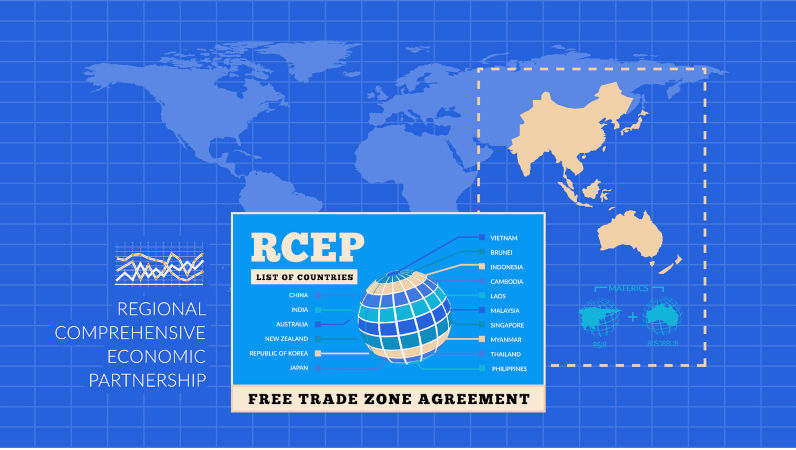RCEP can aid in battle against global protectionism
May 21, 2025
The Regional Comprehensive Economic Partnership, created to promote open trade and regional integration, offers a powerful platform to resist rising global protectionism.
Forged in a period of global economic and geopolitical uncertainty, the RCEP might now be the asset the region needs at a time of genuine crisis for defending the vision of open trade and co-operation that it embodies.
Representing 30% of the global economy and 28% of global trade, and with about 70% of its trade occurring outside its membership, RCEP collectively has a deep interest in rules-based trade born of the structure of its members’ relationships to the global economy.
Given that international trade comprises 99% of GDP on average across the RCEP member countries, trade warfare poses a serious threat to growth prospects, employment and poverty alleviation, especially in Southeast Asia.
The foundational objective of RCEP of enhancing regional economic integration — the market-driven formation of trans-regional value chains in which China is inevitably a key source of inputs, capital and markets — is now fundamentally at odds with the US’ strategy to isolate China economically. The Trump administration is accusing many Southeast Asian economies of “China-washing” trade, ignoring the complexities of regional economies’ participation in China-centred value chains.
This is being done through calling into question the RCEP Certificate of Origin, one of the deal’s key technical innovations, on the grounds that it disguises the quantum of Chinese inputs in goods exported under RCEP rules of origin. Regional economic integration through value chains should be promoted as it builds economic resilience and is a source of development.
These challenges lie alongside the effects of the trade war’s damage to global growth and its implications for the region. The OECD has estimated the cost of US-China decoupling to ASEAN, for example, as an 11% drop in regional GDP. In the longer term, weakening of the principles of non-discrimination and multilateralism undermines the institutional underpinnings of the region’s economic development.
RCEP was always about more than facilitating trade: it has huge potential as a platform for reaffirming an East Asian consensus against protectionism and deepening regional economic integration amid the challenges the global trading system now faces. Its members have an underlying interest in using it to that end. As a 2017 Australian Productivity Commission report warned, the economic damage to RCEP from a global shift to protectionism will be minimised if the East Asian economies avoid retreating to protectionism themselves. RCEP members would in fact gain economically if they liberalised their own economies even if the rest of the world raised tariffs by 15 percentage points.
RCEP is still underperforming relative to this potential. This is not because of any intrinsic deficits in RCEP’s design or membership – indeed, the profile of its membership and its ASEAN centrality is an asset, with RCEP-based processes less likely to be undermined by geopolitical splits and differences of perceived economic interest of the kind that affect other regional platforms such as the East Asia Summit, or bedevil the G20 process globally.
Rather, RCEP risks being sidelined because political leaders haven’t invested enough in establishing its ministerial summits and economic and technical co-operation agenda into the premier platforms for regional economic co-operation that they were designed to be.
Instead, RCEP’s relevance also risks being undermined by focus on the upgrading of “ASEAN plus one” free trade agreements, which in some respects surpass RCEP’s provisions. These deals not only reverse the original intention of RCEP to resolve the so-called “spaghetti bowl” of overlapping trade arrangements, but also raise the question of whether RCEP is being left behind as a tool of regional trade liberalisation.
This problem will be compounded by the inclination of RCEP members to pursue bilateral agreements with the US to earn reprieves from its so-called “reciprocal” tariffs. That could erode the core principles of non-discrimination and multilateralism that RCEP was founded upon – and, alongside the deepening of “plus-one” arrangements, threaten to entangle regional trade in the very institutional complexity RCEP was supposed to simplify.
These realities need to be kept front-of-mind in light of the short-term political incentives to accept protectionist and unilateralist approaches in response to the so-called “reciprocal” tariffs enacted by the US. The diversion of goods caused by the latest round of US tariffs is already prompting the use of anti-dumping mechanisms and similar barriers, a potential slippery slide into the contagion of regional protectionism.
Moreover, with RCEP often inaccurately characterised as a “China-led” agreement, ASEAN must demonstrate its ownership by taking the lead in putting political momentum behind the agreement’s implementation and deepening.
At a time when ASEAN needs to show that it can take a lead in the management of regional affairs, co-operation within RCEP is a ready-to-hand mechanism for operationalising ASEAN centrality and for the projection of the region’s core economic interests on the global stage.
Building off the ASEAN principles of equality among parties, RCEP offers a platform within which the interests of smaller and less-developed economies can be articulated and integrated into co-operation and liberalisation efforts to overcome the costs of protectionism elsewhere.
With leadership from its core ASEAN caucus and the constructive participation of ASEAN Dialogue Partners enmeshed in the agreement, RCEP has a pivotal role to play in shaping international trade policy dynamics. RCEP provides a ready-made platform for ASEAN’s political leaders to protect and project their multilateral interests.
Republished fro East Asia Forum, 18 May 2025
The views expressed in this article may or may not reflect those of Pearls and Irritations.

